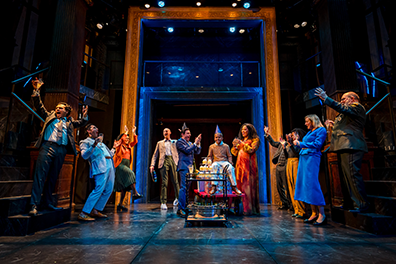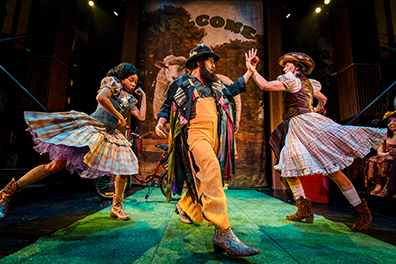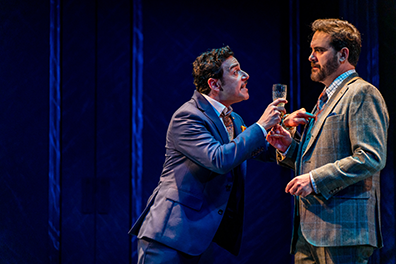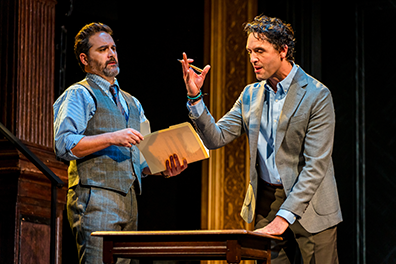The Winter's Tale
Shaking Booty and Hearing Voices
Folger Theatre, Washington, D.C.
Saturday, November 11, 2023, K–13 (stalls, back row)
Directed by Tamilla Woodard


Sicilians and Bohemians love to party in the Folger Theatre's production William Shakespeare's The WInter's Tale. Top, Sicilia celebrates Mamillius's 8th birthday (Richard Bradford, center) flanked by his father, Leontes (Hadi Tabbal), and his mother, Hermione (Antoinette Crow-Legacy) while Sicilian and visiting Bohemian lords and ladies cheer, including Bohemia's king, Polixenes (Drew Kopas, second from left). Above, Autolycus (Reza Salazar) dances with Bohemian peasants (Sabrina Lynne Sawyer, left, and Kate Eastwood Norris) during the sheepshearing feast. Photos by by Brittany Diliberto.
There’s a lot of Bohemian booty shaking at the Folger.
That is the lasting impression of the Tamilla Woodard-directed production of William Shakespeare’s The Winter’s Tale—perhaps unfortunate, depending on your theatrical tastes and tolerance for booty-shaking. I’m wide open on my theatrical tastes and indifferent to booties that shake, but Bohemia is not where this play ends. Besides, it was the production’s first impression that spoke more profoundly to me—spoke being a literal term.
So, in case you’re now inclined to peel off to another Shakespeare or a Shakira website, here is this review’s highlights of a highly energetic production running 2:50 (including intermission) that is brimming with profundity though not fully executing its source’s potential. We’ll give a shoutout to Cody Nickell for his singularly blazing performance as Camillo and to Antoinette Crowe-Legacy for her nuanced character arc as Hermione. We’ll acknowledge Reza Salazar’s great audience interaction as Autolycus. We’ll tell whoever is playing the bicycle spokes that Ray Cooper is calling for some tips. And I’ll admit that lately I’ve been hearing voices, too.
This is the Folger Theatre’s first production in three years while the Folger Library undertakes a major renovation (the rest of the building will reopen to the public sometime in 2024). After you get through the brand-spanking-new lobby, the theater space itself is unchanged: same designer-bedeviling pillars on the stage, same audience-crammed seating in the stalls. The Folger determined to maintain the original theater’s evocation of a Tudor inn’s courtyard.
This production also is one of the Folger’s two entries in the Shakespeare Everywhere festival involving 12 Washington, D.C., institutions presenting 23 theater, opera, and ballet productions, concerts, exhibits, lectures, and other programs this fall (for Shakespeareances coverage of the full festival, click here).
Both kingdoms serving as the The Winter's Tale's setting, Sicilia and Bohemia, are into partying—until Sicilia’s King Leontes (Hadi Tabbal) starts talking to himself early in the play and Bohemia's King Polixenes (Drew Kopas) starts threatening old men and children later in the play. The action opens with the carousing cast descending the theater aisle, offering handshakes and goodies to audience members. They are celebrating the eighth birthday of Leontes’s and Hermione’s son, Prince Mamillius (Clarence Michael Payne on opening night alternating with Richard Bradford through the run), who’s playing with a teddy bear almost as big as him. Costume designer Sarah Cubbage subtly establishes the cultural differences between the two kingdoms in her modern dress designs. Sicilians don suits and ties for their party while Bohemians party in casual jackets and open collars and, later, fancy cowboy wear; their dashing king, Polixenes, is in a light blue casual suit with a white tee and a scarf tied around his neck. Raul Abrego Jr.’s austere set for Sicilia features a large blue set of sliding doors at the back of the stage, its gold frame extending above the glass-walled upper gallery. In Bohemia those doors bear a large “Welcome” poster portrait of a sheep.
The play’s opening conversation, the Sicilian and Bohemian lords discussing which kingdom throws the best parties, takes place amid the hubbub of the mingling crowd before the two kings, lifelong friends, emerge arguing whether Polixenes will stay a week longer, as Leontes insists, or depart tomorrow, as Polixenes intends. Leontes enlists his nine-month pregnant queen to convince Polixenes to tarry. Just 80 lines later, during which she succeeds in accomplishing her husband’s request, comes the play’s crux line: Leontes’s “Too hot, too hot!” launching his rabid jealousy. In this timeframe, Crowe-Legacy establishes Hermione as a sassy teaser with Polixenes and a loving quibbler with her husband—all in fun and charm, innocent of even flirtation.
What triggers Leontes’s jealousy? His own insecurities. We see them in Tabbal’s nervous demeanor, uncomfortable even at his son’s birthday party with his best friend on hand. His behavior turns more petulant as he yearns for the teasing Hermione to acknowledge the one time she “spoke to better purpose” than just now enticing Polixenes to extend his visit, that better purpose being when she accepted Leontes's marriage proposal. This humorless Leontes doesn’t have trouble with the “Too hot, too hot” thematic and tonal transition—though Tabbal emphasizes the moment by yanking loose his tie and pulling off his jacket—because the roots of his jealous tyranny were already there. He just needed confirmation, which he finds by consulting only his own imagination.
“Confirmation bias plus growing paranoia plus compulsive circular reasoning is perhaps familiar to our own experiences today,” Woodard writes in her director’s essay, comparing this 413-year-old play to a current world abounding in “conspiracy theory, extreme nationalistic ideology, racial, gender, lingual bias, and so on.” However, Woodard continues, “it’s important to me that we don’t look at this man, Leontes, as simply prone to jealous outrage or tyrannical tendences. Perhaps his spiral into jealousy is driven by obsessive thought and obsessive possession fueled by great love. Love is in fact the other side of Hate.” One might wonder how a woman like Crowe-Legacy's Hermione would have accepted this Leontes's marriage proposal in the first place, but their personalities also hint at how his nature might have evolved, and everybody reports Leontes to be a good guy.
To visually illustrate the self-echo chamber of Laertes’s soliloquies and asides—and occasionally his public pronouncements—Woodard employs subtle isolating lighting (designed by Max Doolittle) and an electronic soundtrack that grows louder and more chaotic the more intense Leontes’s meditations grow (sound design and music composed by Matthew M. Nielson). Some may see this as unnecessary gimmickry, but these sequences hit close to home for me.
I’ve long considered The Winter’s Tale an intriguing yet middling product in Shakespeare’s canon. With its themes of faith and time’s passage, it has grown in relevance for me as I navigate my just-turned-66 wife’s ever-evolving Alzheimer’s and watch her slow-grinding yet too-soon demise. Now I’m watching this play as representation of my past summer of conversations with disparate, disem-my-bodied voices that I identity as God, or a spirit, or, more generically, “the cosmos.” Sounds crazy, right? Precisely! I think so, too, especially while watching Woodard’s staging emphasize how Leontes resides in a psychotic reality of his own making. I’ve been experiencing the similar static of internal conversations on my daily “prayer walks.”
Crazy, yes, but dangerous? Consider, as I did while listening to it in this production, how Leontes reveals Hermione’s adulterous affair to his top aid, Camillo, including his belief that she is pregnant with Polixenes’s child. Leontes lists for Camillo the evidence his imagination has unearthed:
Is whispering nothing?
Is leaning cheek to cheek? Is meeting noses?
Kissing with inside lip? Stopping the career
Of laughing with a sigh?—a note infallible
Of breaking honesty. Horsing foot on foot?
Skulking in corners? Wishing clocks more swift?
Hours, minutes? Noon, midnight? And all eyes
Blind with the pin and web but theirs, theirs only,
That would unseen be wicked? Is this nothing?
Then, Leontes orders Camillo to poison Polixenes.
As Leontes rails, Nickell’s Camillo first tries to dissuade his king from this line of thinking, but ultimately listens patiently as the tension builds in the room. That room being the theater itself, when Leontes exits, Nickell releases his WTF shock with a wailing sigh, prompting the audience to exhale with a laugh. Camillo knows that his master is “in rebellion with himself.” This got me thinking about a phone call I had with my brother about three months ago when I detailed for him all that the cosmos was telling me about my life ahead. After hanging up, I relived the conversation in my mind and thought that my brother, Camillo-like, must have turned to my sister-in-law and said, “He’s gone certifably insane, convinced his voices are real and telling him the future.”
And yet, my voices, imaginary or not, have so far and for the most part been speaking truth. My internal/spiritual conversations have guided me through the Alzheimer’s chaos and its debilitating stress while coaching me to several major professional successes and opening new career paths. Even my brother told me in another phone call a few weeks ago, “Everything you said was going to happen is happening." The difference between me and Leontes is that I know how his play ends before he does. I’ve hitched my heart and soul to The Winter’s Tale’s most important line, which comes in the final scene as Hermione’s chief counselor, Paulina (Kate Eastwood Norris) prepares to bring Hermione’s statue to life: “It is required you do awake your faith.”
“Faith suggests to me something more durable than belief,” Woodard writes in her essay: “It requires trust in another and hope in our future selves. Belief is something that swirls around inside our heads, sometimes festering and spoiling our perception, making us sort ourselves into those who believe the same and those who don’t.” Such as Leontes, not even giving up his belief when the god Apollo sends an unequivocal message that Hermione is chaste and Leontes is a “jealous tyrant.”
Though this production’s choices resonate with me personally, it still must execute Shakespeare’s plot. In some ways it succeeds through some interesting casting choices and a couple of pinpoint performances; ultimately, its stagey busyness gets in the way.
Crowe-Legacy gives us four distinct Hermiones linked by her four key plot-driving scenes. Her commanding presence we see in her spirited opening scene is still present when Leontes barges into her apartment and publicly accuses her of bearing Polixenes’s child. Hermione at first wonders if it’s “Sport,” but as she realizes Leontes is in earnest, Crowe-Legacy maintains the queen’s proud conviction of the truth, yet feels compassion for her husband more than fear of him. Upon beseeching Leontes to allow her women to accompany her to prison, noting “my plight requires it,” she silences her crying maidservant with a sharp, “Do not weep, good fools, there is no cause.” Before departing, Hermione delivers one of the most loving yet devastating lines in all of Shakespeare: “I never wished to see you sorry; now I trust I shall.” Crow-Legacy lands the line with a resonance that sends shudders through the audience, then reaches out to stroke Leontes’s chin. He jerks his head back to avoid the gesture. A long silence ensues as she drops her untouching hand, looks disdainfully at him, and commands with seething irony in her voice, “My women, come: you have leave.”


Camillo (Cody Nickell) displays his listening skills with two kings in WIlliam Shakespeare's The WInter's Tale: Sicilia's jealousy raging Leontes (Hadi Tabbal, top) and Bohemia's authoritarian father Polixenes (Drew Kopas, above). Photos by Brittany Diliberto.
Her next appearance causes Norris’s Paulina to gasp upon seeing Hermione for the first time since her imprisonment, during which the queen gave birth: Her hair is straggly, her eyes have deep shadows, her breasts are engorged, and her dingy gown is bloodstained. Though her speeches in this scene are defiantly proud, Crow-Legacy under Woodard’s direction plays Hermione with little stamina. Given Hermione's immediate postpartum condition mentioned in the text, this rings more true than most portrayals I’ve seen and visually emphasizes the unnecessary tragedy unfolding for mother, son, just-born daughter, and the kingdom of Sicilia. The sounds of passing traffic and hallway steps suggest the trial as public spectacle, per the text's descripion of "this place, i'th' open air," and Leontes’ statement that “as she hath been publicly accused, so shall she have a just and open trial”—disingenuous of him because he’s the one who accused her in public. He wants the public transparency not for her sake but for his intent to humiliate her. He’s not expecting Apollo to spoil his plans, let alon the immediate tragic consequences he incurs for defying the god.
In the play’s final moment after Hermione's resurrection, Crowe-Legacy plays her as subdued; glad to have what’s left of her family in her arms, but grieving the wasted life and time.
Nickell always turns in revelatory performances in key roles across the D.C. theater landscape. The third most prevalent line-speaker in the play behind Leontes and Paulina, Camillo is the only character spending extensive time in both Sicilia and Bohemia. After helping Polixenes escape Leontes’ jealousy-fueled wrath, he becomes the Bohemian king’s top aide. Being a top aide to kings means listening well and respectfully, which Nickell does nobly and noticeably (great actors know the value of stillness on stage). Yet he also finds lines and phrases that he delivers with subtle comic intonation and timing, revealing Camillo as one of the play’s most distinct personalities. He says his heart is still in Sicily, but he certainly finds unabashed joy in Bohemia, as do the rest of the cast (thanks to doubling parts) and us.
Yet the Bohemians scenes start with tragedy. After Paulina’s husband, Antigonus (Stephen Patrick Martin), arrives in Bohemia with Hermione’s exiled baby daughter, whom she named Perdita in a dream, he exits pursued by a bear, represented as a shadow on a screen at the back of the stage. Through smoke and “Hallooos!” from behind the stage and behind us, Martin reappears as the Old Shepherd. Finding the baby his Antigonus had just left on the stage is a nice metatheater nod to the play’s thematic arc of rebirth in Bohemia. Another piece of apt doubling comes with the character of Time, advancinc the plot 16 years, played as an English judge in robe and wig by Payne/Bradford, last seen as Mamillius being taken away from his mother to his eventual death by heartbreak.
ASIDE: A Bearable Play
Much is made of the most famous stage direction in the history of theater: “Exit, pursued by a bear” in The Winter’s Tale.
Why a bear? Many have pointed out that the Globe’s neighborhood had bear-baiting pits, so live props were readily available, though given its composition date around 1610, The Winter’s Tale may have debuted at the indoor Blackfriars theater. Besides, what actor or theater manager would want to take that risk? Likely, an actor “presented” a bear as Snug did Lion in A Midsummer Night’s Dream.
Whatever inspired William Shakespeare to feature a member of the Ursidae family, he had bears on his mind while writing The Winter’s Tale beyond the stage direction. The word bear and its derivatives appear 38 times in the play. Most of these use the sense of carrying or conducting something, such as Camillo being Polixenes’s “cup bearer,” Polixenes wondering how “best to bear” Leontes’s jealous wrath, and Leontes noting that his son, Mamillius, “does bear some signs of me.”
Nine uses of bear refer to the species, but only six of those are specific mentions of the bear that eats Antigonus, including the stage direction. The Shepherd’s Son allegorically refers to Autolycus as a bear, and Antigonus mentions “wolves and bears” when he takes Perdita into Leontes's ordered exile.Two other uses of bear come in the final scene when Antigonus’s widow, Paulina, twice within five lines tells Leontes to “forbear” touching the statue of Hermione.
One other significant derivative of bear occurs even as the wild bear is at its dinner: the infant Perdita is wearing a “bearing-cloth,” which is a christening gown, according to Arden’s third edition of the play.
Shakespeare’s initial audiences used the lexicon of “hearing a play” not seeing a play when they went to the theater. With so many bears crossing their aural landscape, that famous exit line is part of a figurative arc running through The Winter’s Tale. In whatever manner his company presented the bear—a real bear, a man playing a bear, or some form of puppet—Shakespeare’s image-driven style of composition bears the credit for the bear being there. — Eric Minton
As Woodard turns the tragedy of Sicilia into the raucous comedy of Bohemia, the plot shifts to Polixenes, worried that his son Florizel (Jonathan Del Palmer), mentioned in the play’s first scene, is enjoying romantic trysts with a shepherd girl, the grown-up Perdita (Kayleandra White). “Romantic trysts” is an understatement: In this production they get their sexy on big time.
Polixenes and Camillo don disguises to spy on Florizel, which leads us to the sheepshearing feast. It has rhinestone cowboy costuming: Florizel bears the world’s largest-ever set of chaps, and the Shepherd’s Son (Nicholas Gerwitz) wears a multicolored flower-patterned shirt with tasseled sleeves, large glittering belt buckle, and tight violet pants. It also has such energized-maximus line dancing that Nickell’s otherwise reserved Camillo is moved to jump in. He picks up a melodica and leads the ensemble into a throbbing musical groove with a percussion section comprising a cooler, bottles, stomping feet, and bicycle spokes.
Leading the way to this get-down hoedown is Salazar’s Autolycus, who earns a laugh by merely arriving on his kiddie's bike with tasseled handlebars. In addition to showing off his pocket-picking prowess with precisely choreographed moves and selling his ballads as cassette tapes (credit to properties designer Chelsea Dean for finding such relics), Salazar demonstrates Autolycus’s manipulative capabilities using the Folger’s audience. Upon coaching us to say “Ho” after he says “Hey,” he leads us in an extended “Hey-Ho” song we maintain without his prompting.
The party spirit dissipates as Florizel’s announced intention to marry Perdita leads his father to shed his disguise and all sense of grace with a tantrum promising cruel violence on everybody on stage—except Camillo. The twice-loyal aid engages in his second act of justified treason by getting everybody back to Sicilia. There, the reunions of families and friends and Leontes’ desultory penance doesn’t maintain the play’s momentum to the final climactic scene of grace and redemption. Bohemia was just so much more fun.
Eric Minton
November 26 2023
Comment: e-mail [email protected]
Start a discussion in the Bardroom



 Find additional Shakespeareances
Find additional Shakespeareances